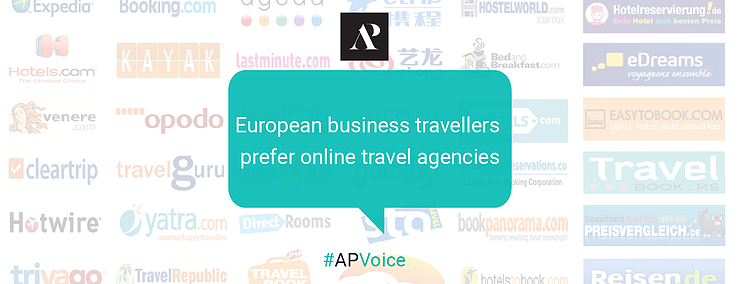LONDON, UK, 2018-Dec-27 — /Travel PR News/ — Fresh research from SAP Concur and Global Business Travel Association (GBTA) shows that, nowadays, business travellers are less likely to book flights and accommodation directly from suppliers. In other words, online travel agency (OTA) bookings have now surpassed direct bookings to become the more popular option, particularly for those travelling for business. In this study, 1,252 business travellers, hailing from an assortment of European countries like the UK, Belgium, Germany, France and various Nordic countries, who travelled for business at least once in the last year were polled. The figures show the number of European business travellers booking flights directly with their preferred airline drop from 79% in 2017 to 68% this year. In the same time period, direct hotel bookings dropped 13%, from 83% to 70%.
EMEA SVP and general manager of SAP Concur, Pierre-Emmanuel Tetaz suggests that “the move away from direct bookings and the high and relatively steady use of online booking tools in 2018 can be attributed to the belief amongst business travellers that their employers are somewhat or very advanced when it comes to the travel booking technology on offer”. Furthermore, there is compelling evidence that European workers are more drawn to alternate booking channels like OTAs due to the variety of choice and pricing open to them. In short, this section of travellers prioritise flexibility when it comes to determining their business trips, as opposed to slavishly following the travelling wishes of their companies or employers. European business travellers are opting to book however they want instead of how they are told to for a number of key reasons. Firstly, pricing is quite a significant factor to consider. The aforementioned research demonstrates that 52% of travellers turn to OTAs because the prices were simply better and more affordable. Another 49% of travellers felt OTAs were a better bet due to the increased availability of travel options.
Still, the research does show that a significant proportion of business travellers (39%) remain reliant on direct bookings for the sake of loyalty rewards, which is a great incentive if one frequently travels for business. Whilst OTAs and other alternate channels undoubtedly offer more convenience, selection and competitive prices, such channels are generally not deemed to be authorised booking channels within a company’s travel policy. From a company or employer’s perspective, this is problematic as the utilisation of non-corporate booking channels raises significant traveller safety concerns. Because companies and employers have no control over alternate booking platforms, their ability to track and keep their travelling employees safe is undermined. GBTA’s Director of Research, Jessica Collison, asserts that booking data continues to “play a critical role in traveller safety” and that the use of non-corporate booking tools creates “a lack of visibility which has critical implications for both travel spend and the ability to meet duty of care responsibilities”. Companies have had to get around this hurdle by requiring their travelling employees to forward their itineraries to the relevant person within the company. This person will then generate travel expense reports, allowing companies to keep an eye on expenditure.
The reality is that more can be done to encourage the greater use of corporate channels to the advantage of both the traveller and their employer. The GBTA/Concur findings illustrate that personalised bookings and pre-trip approvals are perceived to be the most impactful. Above all, business travellers are looking for convenience and personalisation. If the approved corporate channels became increasingly convenient and personalised, we should see a surge in direct bookings. When asked about features they would like to see in corporate booking tools, interestingly 31% of biz travellers viewed a live chat function as more important than chat powered by artificial intelligence and virtual reality. Technology aside, the flexibility of travel policies can also dictate the rise and fall in the use of corporate channels. In a typical example, 74% of travellers working for companies with fairly flexible policies still booked directly with an airline. This number fell to 64% amongst travellers whose corporate policies were much stricter.
These are just a few things companies and employers can take on board in order to boost employee usage of company-sanctioned booking platforms. Our AP sales team is happy to talk to your hotel about how it can encourage more bookings from corporate travellers.
Source : http://ow.ly/6iHd30mXoUD
Logo:


